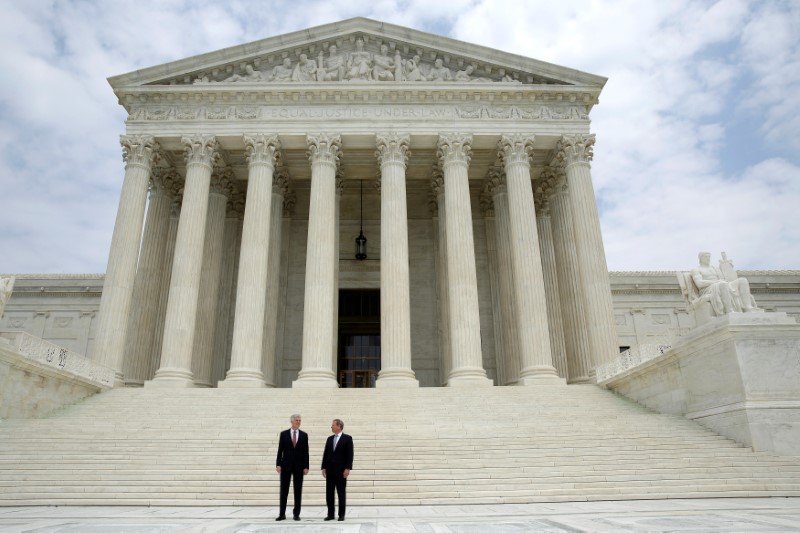By Lawrence Hurley
WASHINGTON (Reuters) - President Donald Trump visited the Supreme Court on Thursday for the first time since taking office to attend a ceremony for Neil Gorsuch, the justice he appointed, as the court mulls what to do with his blocked ban on travelers from six Muslim-majority countries.
The president and first lady Melania Trump were present in the marble-clad courthouse for an investiture ceremony formally welcoming Gorsuch to the top U.S. court. Gorsuch was confirmed by the Senate and sworn in as a justice in April and authored his first ruling last week in a debt-collection case.
Trump sat near the front of the ornate, burgundy-draped courtroom as Chief Justice John Roberts offered him and the first lady a "warm welcome" in opening remarks. The president sat quietly as Roberts administered the judicial oath to Gorsuch and joined the crowd in applauding Gorsuch, smiling broadly.
In appointing Gorsuch, Trump restored the court's 5-4 conservative majority.
Trump did not speak at the event.
Other notable figures at the ceremony included several members of the Senate Judiciary Committee and attorneys general during George W. Bush's presidency, including John Ashcroft and Alberto Gonzales. Also attending was Kenneth Starr, the former independent counsel who investigated Bill Clinton during his presidency.
A special counsel examining whether Trump's presidential campaign team colluded with Russia in the 2016 election is now investigating Trump for possible obstruction of justice.
Trump's travel ban is now before the justices after being blocked by lower courts. In deciding whether to allow the travel ban to go into effect, the justices are set to weigh whether Trump's election campaign rhetoric can be used as evidence that the March 6 order was intended to discriminate against Muslims in violation of the Constitution.
Trump during the 2016 presidential campaign called for a "total and complete shutdown of Muslims entering the United States."
The court is currently considering an emergency request from Trump's administration seeking to put the travel ban into effect while litigation continues.
Federal judges in Maryland and Hawaii blocked Trump's 90-day ban on travelers from Libya, Iran, Somalia, Sudan, Syria and Yemen. The Hawaii judge also blocked a 120-day ban on refugees entering the United States. The injunctions blocking the ban were upheld on appeal.
Trump was able to make the appointment of Gorsuch only because the Republican-led Senate last year refused to consider former President Barack Obama's nominee to the court, Merrick Garland.
